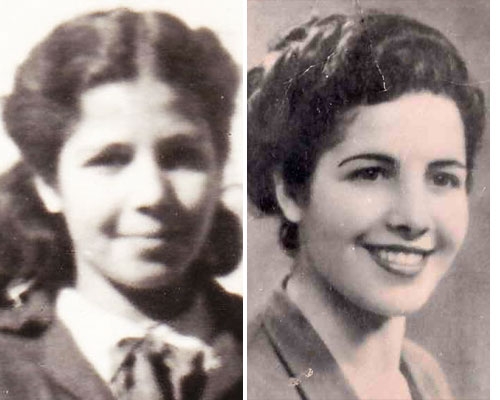Giuliana and Alberto Moscato Identified
June 30, 2014

Giuliana and Alberto Moscato along with their four siblings spent six months hiding in a slaughterhouse at Portuense, a destitute neighborhood on the periphery of Rome where a peasant prevented Giuliana's family and others from being discovered. The conditions were harsh, but the Moscato children were kept safe there. The same was not so for the children’s mother, Fortunata.
Fortunata Sciunnach was born in Rome in July 1911. She married Pace Moscato when she was 20. Their economic conditions were not prosperous, but Pace was a hard worker, and he always managed to make ends meet, even when the family started to grow. Vittorio was born in 1932 and five more children followed, one every two years: Giuliana, Alberto, Carla, Ornella, and Gianni.
The family lived in via della Reginella, in the Jewish ghetto, together with Fortunata's parents, Alberto and Costanza. Under the Fascist regime, life was not easy for the Italian Jews; they faced difficult economic conditions and daily humiliations. But because the Italian government only loosely complied with Nazi orders to round up and deport all Jews, they did not have to live in hiding. Everything changed abruptly when Italy surrendered to the Allies in September 1943, and Germany quickly occupied the north and the center of the peninsula.Recognizing the growing danger, the Moscato family decided to go into hiding. Vittorio was 12 and Gianni, just older than one. But Fortunata's parents were too aged to move, so they stayed behind in the ghetto. After a while, Fortunata decided to leave the children with her husband and to move back to care for her parents. On October 16, 1943 the Nazis conducted the first massive action in the ghetto, rounding up 2,000 Jews, concentrating them at a transit camp in Fossoli, and from there deporting them to Auschwitz. Fortunata and her parents were among the first Italian Jews deported. Fortunata’s younger sister, Letizia, was also arrested and deported.
In the following months, Giuliana, Carla, and Ornella found shelter in a Catholic convent.
When the war was over and survivors of the camps came back, Giuliana was the first one to meet them and ask about her mother's fate. Finally, a woman returning from Auschwitz—the only female survivor of the 16 October round-up—told Giuliana the terrible truth: Fortunata and her parents had been sent to the gas chamber as soon as they stepped off the train.
Pace was left alone to care for six children. Deeply saddened, he was unable to resume his work or raise the children. The little ones spent their childhood between Jewish institutions for orphans and the homes of Fortunata or Pace's siblings, where they never felt welcome.
Giuliana stayed in the orphanage for only two years. For the younger ones, the time was longer: Ornella and Gianni, four and two when the war was over, went through all of the Jewish orphanages in Rome.
The family had no luck in the following years: Carla, who was only six when her mother was deported, died at 15 of a cardiac condition.
When the boys were old enough, barely 12, they started working with Pace. They produced and sold mattresses, box springs, and cushions.
After leaving the orphanage, the girls went to live with a relative, where they became the maids and the nannies of the family. Ornella has bitter memories of her childhood, when the only person to care for her was Giuliana, who was already married. Unfortunately, Giuliana died at thirty-three of a tumor, leaving two very young children. To Ornella, the loss was terrible; it was like losing her mother for a second time. She says that she has no memories of Fortunata, but Giuliana, six years older, had been a mother to her.
Today, Alberto, Ornella, and Gianni live in Rome. All are married with children and grandchildren.